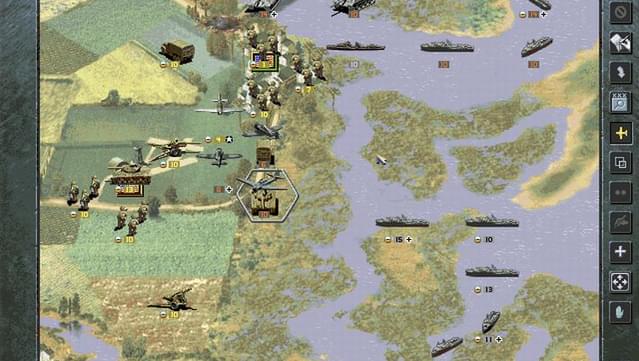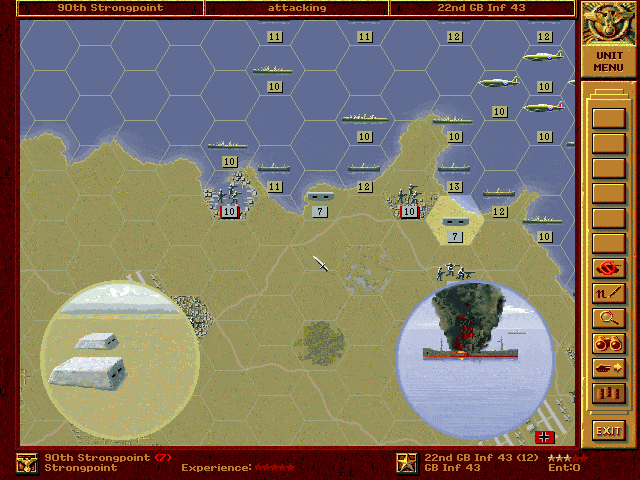Overview
Turn Based World War 2 Strategy Game, a remake of old Panzer General 2. (c) 2014 Nicu Pavel. Files for MS-DOS, Windows and Mac can be found. But for Windows 7/10 users, the Windows version is the best choice and works great with both OSes. Selecting Panzer General for Windows 95 version 1.2 (88.5 mb) from PanzerGeneralDownload, Panzer General comes in a quick and easy to use package. Extract to wherever you please and make sure to read. Supporting Mac versions has created an enormous amount of work and only limited sales. A good example is the new Catalina update preventing all 32 bit apps running. Apple could have supported them but chose not to, to force developers to build apps in 64 bit, which in turn forces users to upgrade hardware and OS to run them. Panzer General II, as its name implies, focuses exclusively on troop and tank warfare in Europe, including some aerial and naval combat for Blitzkrieg and beachhead scenarios, but there are no Pacific Theater, ship-to-ship scenarios or campaigns.
Panzer General II returns to the ever-popular European World War II theater with a turn-based strategy game that plays out a variety of major battle scenarios with the plodding effectiveness of a tank. There is nothing new or innovative in the way it creates a quick, fast-paced, playable gaming experience similar to Milton Bradley's WWII strategy board game Axis and Allies.

Gameplay
My first look at Panzer General II confirmed my expectations of a good balance of strategy and playability. There are not a lot of complex economic and social models to complicate the issues of military strategy. Ease of play is emphasized over historical realism. The game includes over 40 scenarios, three campaigns and a Scenario Editor, which provide ample opportunity to recreate the major European engagements of World War II as well as a few hypothetical ones, such as an invasion of England and an invasion of the United States. If you are looking for a game that covers the entire gamut of World War II, this is not the game for you. Panzer General II, as its name implies, focuses exclusively on troop and tank warfare in Europe, including some aerial and naval combat for Blitzkrieg and beachhead scenarios, but there are no Pacific Theater, ship-to-ship scenarios or campaigns.
The basic unit of the game is a scenario that covers a specific battle, with a campaign consisting of scenarios strung together with the added bonus of accumulated experience. It is this narrowness of focus, precluding a larger, more comprehensive representation of the entire war, which helps make the game fast and easy to learn. Each scenario is defined by the following characteristics: Nationalities, Prestige Points, Number of Turns, and specific sets of defined military objectives on the battlefield which must be held or gained.
Nationalities break down into the traditional split of the Axis, which is Germany, and the Allies, which varies between the United Kingdom, the United States, France, the USSR, Spain, Finland and even Poland. Prestige is a combination of military success and economics, which allows the player to re-supply current units and requisition new troops and equipment over the course of the battle. Prestige can be adjusted at the beginning of a scenario to change the odds between players. The number of turns controls the amount of gameplay, as well as measuring the difference between victory and defeat. Victory is defined in three ways, Brilliant Victory, Victory, and Tactical Victory, depending upon the number of turns it takes to capture all the objectives. Gaining all the objectives in the fewest possible turns is a Brilliant Victory, doing the same in an average number of turns is a Victory, and using all the turns in a scenario is a Tactical Victory. Failure to achieve all objectives is a defeat, while giving up held objectives to the computer will also result in a loss. All these elements combine to create a variety of tactical and strategic situations. An interesting example of this is the Cauldron scenario set in North Africa, which was one of the most difficult for me with its short battle time of 6 turns. I played it over and over, attempting to avoid overexposing my offense while still moving fast enough to capture the objectives.
The controls seem to act like something built in the 1940s. They get the job done with a minimum of fuss, but they are clunky at times. The process of requisitioning new troops or equipment requires you to click on too many screens. However, what they lack in finesse they make up for in simplicity, generally contributing to the speed of the game.
Getting started is best accomplished with the tutorial, which offers a quick introduction to the game and how it works. It doesn't explain everything you need to know for all the scenarios, but establishes a basic framework from which to explore the more complicated nuances of the game.
Graphics
'The Living Battlefield' represents not the next level of gaming, but an average, run-of-the-mill representation of a board game ported to the PC. The landscapes look good, depending on terrain -- the desert is a uniform tan, while the mountains and woods look better. I found it easier to understand the map with the grid overlay turned on, as it made it easier to determine where I wanted to move. The least impressive part of the graphics is the troop units, which lack the detail of the planes and tanks. All in all, it looks like a board game with its huge tanks and troops traversing all over a fairly realistic terrain.
Audio
Both the soundtrack and the background noises are rather subdued, helping to set the mood without being too obtrusive. The sounds of rifle shots, tank tracks, and artillery fire help accentuate the mood of the battle and let you know what is going on. The music more than anything lets you know what side you're playing -- bagpipe music for Scottish troops working as a part of the forces of the United Kingdom or something out of Doctor Zhivago for the Soviet army -- but its best attribute is that it didn't overwhelm the game itself.

AI
Panzer General II utilizes a solid AI, but it suffers from the lack of control. The computer is consistent in its defense or attack, always focused on taking or defending battlefield objectives with directness. Leave your flank open, and it drives around your forces and captures your undefended objective, ending the battle for you with a loss. It also realizes the need for delaying action to slow your attack down to a crawl. The biggest downside to the AI is that you are unable to directly control it. There are no specific AI settings, only the ability to control the starting Prestige to give yourself an advantage and the computer a disadvantage. Another disappointment is that each scenario starts out the same and gets easier with each subsequent time you play it. I would have liked to see a random generation or something to provide more of a challenge.
In addition to Prestige, there are two items which have a huge impact on the AI experience of each scenario. First, Line of Sight is always based upon your unit's position. Although sometimes it would seem that your troops could see further than they are allowed, it makes for a difficult advance when tanks appear out of nowhere and slaughter your advance scout troops. Second, battle scenarios seem to provide a wide difference of challenges. In some scenarios, I achieved Tactical Victories on the first try, while others needed numerous attempts to gain the same thing.
Multiplayer Support/Experience
Panzer General II offers support for two to four players via a LAN, the Internet, their own gaming service Club SSI, and Play-by-Mail. The documentation does not indicate what protocols are supported, except TCP/IP for Internet. Play by Mail is an interesting throwback to older days of gaming, which consists of basically sending saved games back and forth.
Documentation
The manual that comes with game is standard issue: glossy cover, historic photographs, and helpful background overviews for the scenarios and campaigns. However, lacking an index, it fails to provide easy access to all the detailed information that helps make the game more interesting and fun to play. For example, I started a scenario with naval transports ready to unload on the beaches, yet I had to dig through the manual a bit to find out that this is covered under Movement, Embarking and Disembarking Air and Naval Units.
System Requirements
Required: Windows 95 with DirectX5, Pentium 90 MHz, 16 MB RAM, Windows 95 compatible 1 MB video card, Windows 95 compatible sound card, uncompressed hard drive with at least 25 MB free disk space and up to 5 MB for each saved game or scenario, 4X CD-ROM drive, mouse
Reviewed On: Pentium II-266, 64 MB RAM, 20X CD-ROM drive, Matrox Millennium (4 MB), integrated Yamaha soundcard.
Patches/Updates

The 1.01 patch includes a few corrections here and there, as well as Club SSI support. It is available at ftp://ftp.ssionline.com/pub/updates/panzergeneral2/us/pg201.exe.
Panzer General 2 Downloads
Bottom Line

Panzer General 2 Mods
The box for Panzer General II touts the game as 'The Sequel of the Century!' and 'It's an entire generation beyond anything yet seen in strategy games.' It is really only a solid, turn-based strategy game. It suffers from board game level graphics, a clunky interface and a less-than-perfectly-designed manual. However, these defects do not prevent it from delivering a fast-paced, fairly straightforward World War II game, reminiscent of the strategy board games of the past.
Panzer General 2 For Windows 10
